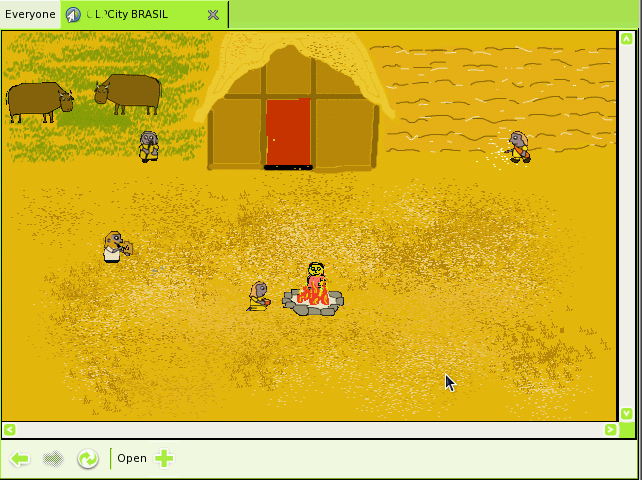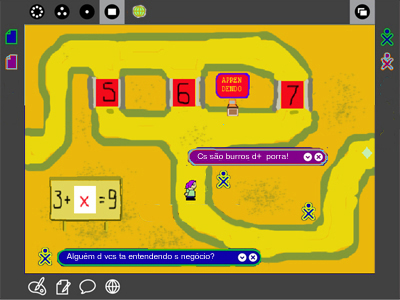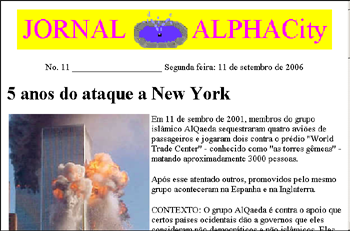OLPCities
Overview and demo
The project "OLPCities" is open and modular. Anybody can create a free available "Lot" having an address (it's really a webpage that can be at any web server, not the same of the "OLPCity" having this "Lot") and somebody can create an "OLPCity" and include the "Lots" they like. If the "Lot" was created in english, you can make a french version, by example, for your french "OLPCité".
A "Lot" contains an activity for kids between 11 and 18 years. Can be a game (educational or not), can be an article about some subject etc. etc. Like we have a prototype running NOW you will understand better our idea soon. Wait a little, read a little more...
The project target is the creation of an interface having the style of the GameBoy from Nintendo (using orthogonal 3D like "Zelda", "Mario Bros." etc.) where the kid's avatar (there are some, to choose one) will "walk" in "streets" of the OLPCity , founding many "activities".
If you know:
- 1 - a little programming;
- 2 - a little design;
- 3 - a little about some interesting subject
or if you can create a group having these skills, you can create a "Lot" or a complete "OLPCity".
It's possible to go from an OLPCity to other OLPCity using a "Portal". The system has "auto-save". If a kid set off his laptop when he is at the "Lot" X of the city, when he comes back, he will be at this "Lot" X.
The project is in alpha phase and we have now only a brazilian (language = portuguese) OLPCity (whose name is ALPHACity) having more or less 20 activities implemented in the areas of: Social Studies, History, English vocabulary etc. We hope that YOU can help us (better to say "to help the kids of poor countries") creating "Lots" or complete "OLPCities".
Using the Mesh network and the BulletinBoard, if a "lot" is shared between the Friends, they can chat about the subject of the "lot" or about any other thing. "Balloons of the dialog" appear over the scenery. Each kid's balloon has a different color.
The project uses JavaScript and is customized for the OLPC laptop, but can be accessed by any kid having a PC and an internet conection.
There are here, at this Wiki, some lessons about how to use specific JavaScript libraries that support the project. And details about the architecture of the application. The link is OLPCities/Tutorials
A "Lot" can be integrated with a database at a remote server and we can, by example, capture the opinions of the kids about some questions and publish the results in realtime. This 2nd tier can be created using ASP .NET or Java Servlets or PHP etc. It's available now, at our alpha version, an research of opinions about the OLPC project. You can vote, if you like :-)
"ALPHACity Brasil" is the name of the brazilian alpha prototype and it's NOW on line. If you have the Microsoft IE browser you only need to go to the address: http://www.dmu.com/olpc.
At the figure we see a "Lot" that is an activity of History, where tha avatar needs to "talk" to some characters. The "date" is the year 3000 A.C !
At ALPHACity you find (AVAILABLE NOW!) a daily newspaper, the "JORNAL DE ALPHACity" (at the figure), created for kids between 8 to 18 years, having explanations of some subjects for their better understandment of the context of the notices.
I know that it's not easy to understand portuguese, but you can take a general look.
The first time you enter at this page you need to choose an avatar.
You can change you avatar at any moment clicking it.
To "walk" use the arrow keys. If the avatar goes near an icon that is an OLPC laptop, occurs a link to a "normal" web page - that can be the "JORNAL DE ALPHACity" or another thing. At this web page there are another icon to be clicked, to return to the orthogonal 3D environment.
At the second "Lot" of the prototype there are a game and an explanation about a "brazilian religion" whose name is "Candomblé". You need to go inside the house and talk to the "mae de santo". When you go out, begins a game. Only after to gain the game - the avatar needs to make contact with all the static balls (representing the main 4 gods) and avoid the contact with the "black ball" (representing the devil) - the avatar can go to the next "house".
At the 3th. "Lot" there are a game about english-portuguese vocabulary. You need to click the correct pairs to go ahead.
At the 4th "Lot" you can vote. ayour opinion is about the OLPC project. Will it be a success? You can see the actual results.
There are, at this "Lot", a "Time-Space Portal" that will transport you to the 5th "Lot" at the year 3000 A.C. After "to talk" with all the characters, the "Time-Space Portal" will open again and you can return to the present.
And etc. etc.
At the tutorials you will find many demos, all in english... AND THEY CAN BE VIEWED AT THE EMULATOR AND AT Windows Internet Explorer.
Comentaries and ideas? You can use this Wiki (discussion).
When someone create a new OLPCity or only a Lot, he can put it available at this page
And now, let´s go to the tutorials about how you (knowing programing) can create YOUR OLPCity. You find the lessons at:
--- Discussion item: OLPCities and adapting to the future --- Submitted by G., 26 September 2007.
The OLPCities idea is brilliant and I agree that it will be an important education/interaction tool. I would like to suggest a potential theme from which additional OLPCities can be created:
By now it is quite clear that climate change is a real problem that will grow more significant throughout this century. It is one of many population/resource problems the world will have to face, among them the decline in petroleum supplies, declines of other critical minerals, shortages of fresh water, and so on. The children of today will be adults when these problems are critical and are having substantial impacts. They will need to be ready to go into action to work on the solutions, reduce impact, and adapt to new conditions.
A simulated physical-space environment offers tremendous opportunities to develop the scenarios, skills, and strategies that will be vitally needed throughout this century. Age-appropriate activities will enable children and young adults to gain practice in thinking about and responding to these issues. For example, when given the scenario of living in a rural village where rainfall is decreasing each year, what will the kids come up with as ways of meeting the need for water for human use, and adapting agricultural practices in order to continue to provide food? For example when given the scenario of living in a coastal city facing rising sea levels, what would the kids suggest as ways to adapt, and how will they respond to each others' suggestions? For example when given the scenario of two countries sharing a common bioregion and critical resources (such as a river that crosses the border), and encouraged to think like the leaders of the two countries, how will they resolve their mutual need for the shared resources?
In each of these cases, kids can be encouraged to do online research and reading, collaborative writing and media production, and what-if ("pretend") thinking from the perspectives of different stakeholders.
"Practicing" to address the crises we know are likely, will provide kids with the experience and confidence to educate themselves in appropriate directions, and tackle these crises head-on as adults.
--- end of comment, G., 26 September 2007 ---


